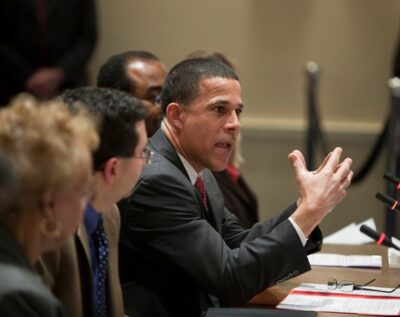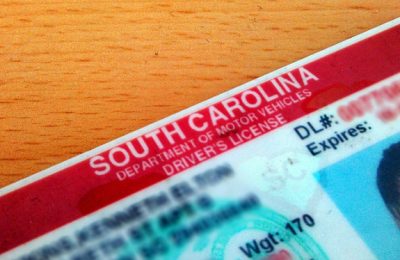Border Enforcement
Migration at the border is a multifaceted issue, challenging the U.S. to secure our borders while upholding the human rights of individuals seeking safety and better opportunities. Balancing national security with compassion and our legal obligations to asylum seekers presents intricate dilemmas, and we collaborate with policymakers to advance bipartisan, action-oriented solutions.
Beyond A Border Solution
- Asylum
- May 3, 2023
America needs durable solutions. These concrete measures can bring orderliness to our border and modernize our overwhelmed asylum system. Read…
Read More
Don’t Jump to Conclusions About Costs of Deferred Action
The Associated Press (AP) reported yesterday that the deferred action initiative for eligible, young immigrants, which is still under development, could cost more than $585 million. While some critics immediately jumped on this as proof that taxpayers would be made to pay for the new initiative, that’s just not the way things work at USCIS. While taxpayers foot the bill for Immigration and Customs Enforcement and Custom and Border Patrol operations, (including the cost of detention and deportation of immigrants) the public doesn’t routinely foot the bill for programs administered by U.S. Citizenship and Immigration Services. In fact, it’s much more likely that the deferred action initiative will be paid for by the people who use it. Read More

Lieutenant Governor Makes Plea for Maryland DREAM Act
At the end of its 2011 legislative session, Maryland lawmakers passed a bill that would allow certain undocumented students to pay in-state tuition rates at Maryland community colleges, joining 12 other states with similar laws. Now, however, opponents of the law have gathered enough signatures to suspend the law and force a referendum come November. Maryland’s Lieutenant Governor Anthony Brown, an advocate for affordable higher education, responded with a plea to voters to consider the contributions of these students and the value of education for all Maryland residents. Meanwhile, lawmakers in other states like Ohio and New Jersey are considering legislation that makes higher education more affordable to all its residents. Read More

Secretary Napolitano Clarifies President’s Deferred Action Plan…Again
Today, DHS Secretary Janet Napolitano testified before the House Judiciary Committee and, as expected, defended the administration’s use of prosecutorial discretion and recently announced deferred action policies for qualified DREAMers—fielding questions and accusations from those who would rather take Napolitano to task than focus on creating smart, humane, and effective immigration policies. Read More

New Injunction Sought in Challenge to Arizona SB 1070
Late Tuesday night, opponents of Arizona SB 1070 filed new papers in court seeking to block Section 2(B) from taking effect, arguing that state legislators were driven by anti-Latino bias and that the provision will inevitably result in constitutional violations. The motion, filed by civil rights groups, cited numerous previously undisclosed emails from former State Sen. Russell Pearce, the main sponsor of SB 1070, containing inflammatory comments about Mexico and unauthorized immigrants. The filing, submitted in federal district court in Phoenix, also sought an injunction against a separate provision of SB 1070 that attorneys argue is invalid under the Supreme Court’s recent decision in Arizona v. United States. Read More

Why the Administration Should Avoid a Fight Over Anti-Detainer Laws
Yesterday’s TIME Magazine carried a story on what it billed as the Obama administration’s “next immigration battle”—the spread of state and local laws around the country preventing jails from holding immigrant detainees on behalf of the federal government. California and Chicago appear poised to join the list, and federal officials have floated the possibility of taking legal action to block such measures. This battle, however, pits states and localities trying to limit inappropriate detention against the federal government’s desire to cast a wide net for potential immigration violators. It’s a fight the federal government should think twice about taking on. Read More

Sheriff Joe Arpaio to Stand Trial on Racial Profiling Charges
Maricopa County Sheriff Joe Arpaio may finally face the music this week in a federal trial in Phoenix. The renowned anti-immigrant media glutton and self-proclaimed “America’s Toughest Sheriff” stands accused of discrimination and harassment charges in a class action lawsuit involving the ACLU and MALDEF. Arpaio has a long history of abuse and discrimination in the name of immigration enforcement—from a segregated tent city to unlawful stops and forcing inmates to wear pink underwear. In fact, Arpaio is also the subject of a lawsuit filed by the Department of Justice earlier this year alleging that Arpaio and his officers targeted Latino drivers during traffic stops and neighborhood sweeps and used ethnic slurs against Latino inmates in county jails. Read More

Voter ID Laws Tackle Non-Existent Problem of Immigrant Vote Fraud
It is election season and voter-fraud hysteria is in the air. A raft of restrictive voter ID legislation from coast to coast is aimed primarily at one imaginary problem: fraudulent voting by immigrants who are not U.S. citizens. Supporters of these laws like to pretend that hordes of non-citizens are stampeding into voting booths and illegally changing the outcome of critical elections. But the reality is that voter ID laws have little to do with the exceedingly rare occurrence of illegal voting by immigrants, or any other kind of voter fraud. These are laws designed to disenfranchise racial and ethnic minorities, the poor, and other social groups that might be inclined to vote for the “wrong” candidates. In other words, voter ID laws are meant to limit democracy, not protect it. Read More

For Immigrants, Alternatives to Detention Not All They’re Cracked Up to Be
On any given day, approximately 300,000 immigrants in the United States have pending removal proceedings to determine whether they will be deported from the country. Of those, about 10% are kept in detention centers while proceedings are pending, with the rest are subject to alternatives ranging from the posting of bail to the use of electronic ankle monitors. While few if any immigrants prefer to be detained, a recent report explains that many alternatives to detention (ATD) program impose hardships themselves. Read More

Some States Attempt to Move Forward on Immigration Laws Following Supreme Court Decision
Prior to the Supreme Court’s recent decision on Arizona SB 1070, other states that passed immigration laws were also embroiled in complicated legal battles. Alabama, Georgia, South Carolina, and Utah all passed restrictive immigration laws, parts of which were challenged in court and subsequently enjoined pending the Supreme Court’s ruling on Arizona. Now that the Supreme Court has ruled, however, each state is now attempting to interpret that ruling in an effort to implement its immigration law. Read More

Civil Rights Groups Resume Legal Challenges to Alabama’s Immigration Law
Less than three weeks after the Supreme Court’s landmark decision in Arizona v. United States—which struck down three provisions of SB 1070 and invited future challenges to a fourth—civil rights groups are back in court resuming their challenges to copycat laws in other states. Going forward, the lawsuits will focus more on how to interpret the Justices’ decision and less on theoretical legal questions about states’ rights. While the cases in Alabama and other states may take years to resolve, it is already clear that parts of the laws will be immediately struck down. Read More
Make a contribution
Make a direct impact on the lives of immigrants.

